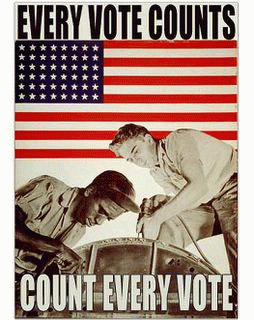| Back OpEd News | |||||||
|
Original Content at https://www.opednews.com/articles/Count-Every-Vote-by-Rady-Ananda-080624-316.html (Note: You can view every article as one long page if you sign up as an Advocate Member, or higher). |
|||||||
June 24, 2008
Count Every Vote: Sampling v. Full Counts
By Rady Ananda
While activists and politicians discuss different audit schemes to check the accuracy of computerized election results, the audit debate obscures the reality that most of the US has stopped reliably counting all the ballots. Whatever percent audited is the only percent of ballots that are reliably counted. Stop asking, what percent to audit; and ask, should we stop counting all the votes?
::::::::
Audit Sampling vs. Full Count ElectionsWhile activists and politicians discuss different audit schemes to check the accuracy of computerized election results, the audit debate obscures the reality that most of the US has stopped reliably counting all the ballots. Whatever percent audited is the only percent of ballots that are reliably counted in the U.S., because repeated scientific studies show that software-driven voting systems provide us with no rational basis to trust reported results.
We can applaud these activists and officials for comprehending the need for hard, discrete evidence. We do need a reliable count independent of software, given the undetectably mutable nature of software. Both the National Institute of Standards and Technology (NIST) and the National Science Foundation's ACCURATE center promote "software independence." Why? Because we cannot trust results produced on undetectably mutable software.
Why, then, insert this expensive, non-securable, unverifiable, non-transparent election system between the ballots and a reliable count? Qui bono?
I suppose this question is similar to asking why finance a war, when our own infrastructure is crumbling. The answer is the same: profits for the few, at the expense of the many.
Beyond mentioning the absurdity of using expensive gadgets that don't work, this essay does not seek to engage the audit debate. The point is that a sample is not a full count of the ballots, by definition. The larger point is,When and who decided we should stop counting all of our ballots?
Because states chose to accept federal funds to buy unreliable computerized technology, we are forced to rely on some other means of determining election results. Informed activists and public officials recognize we must hand count the ballots, and this is what prompts the audit debate. The only "other means" our legislatures will consider is a small statistical sampling of the paper ballots.
In those jurisdictions that use computerized voting systems and that do audit the voter-completed ballot, only a tiny percentage of all ballots cast is reliably counted. This represents well over 90% of US elections with less than 5% of all ballots reliably counted.
That is the reality. With the exception of New York State, and some scattered hand-count jurisdictions, US elections are no longer reliably counted in full.
Only sampling our ballots, and never counting all of them, is inappropriate as a means to determine election results in a democracy. It is especially inappropriate given that the public was not consulted regarding this decision to reliably count only a small percent of all ballots cast.
The raging audit debate misses this point, showing how election integrity advocates have been misled into a discussion that supports the continued use of faulty technology.The frame is not what percent do we audit, but should we stop counting all the votes.
Legislation that permits only a small portion of all ballots to be counted in a reliable manner abrogates the public's right to have all our votes reliably counted.
Authors Bio:
In 2004, Rady Ananda joined the growing community of citizen journalists. Initially focused on elections, she investigated the 2004 Ohio election, organizing, training and leading several forays into counties to photograph the 2004 ballots. She officially served at three recounts, including the 2004 recount. She also organized and led the team that audited Franklin County Ohio's 2006 election, proving the number of voter signatures did not match official results. Her work appears in three books.
Her blogs also address religious, gender, sexual and racial equality, as well as environmental issues; and are sprinkled with book and film reviews on various topics. She spent most of her working life as a researcher or investigator for private lawyers, and five years as an editor.
She graduated from The Ohio State University's School of Agriculture in December 2003 with a B.S. in Natural Resources.
All material offered here is the property of Rady Ananda, copyright 2006, 2007, 2008, 2009. Permission is granted to repost, with proper attribution including the original link.
"In a time of universal deceit, telling the truth is a revolutionary act." Tell the truth anyway.
